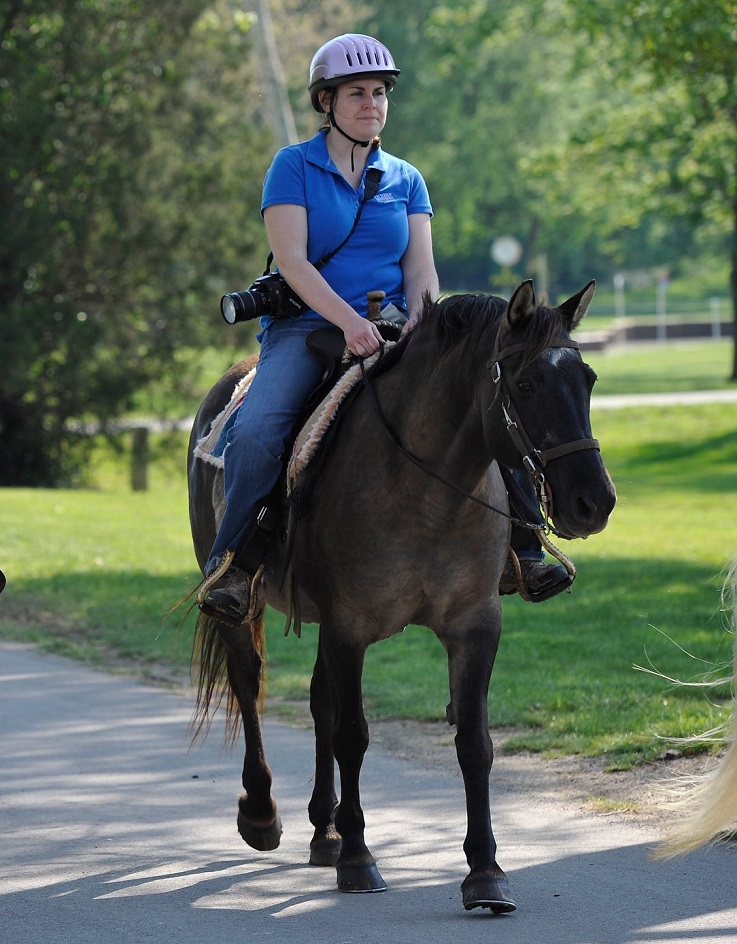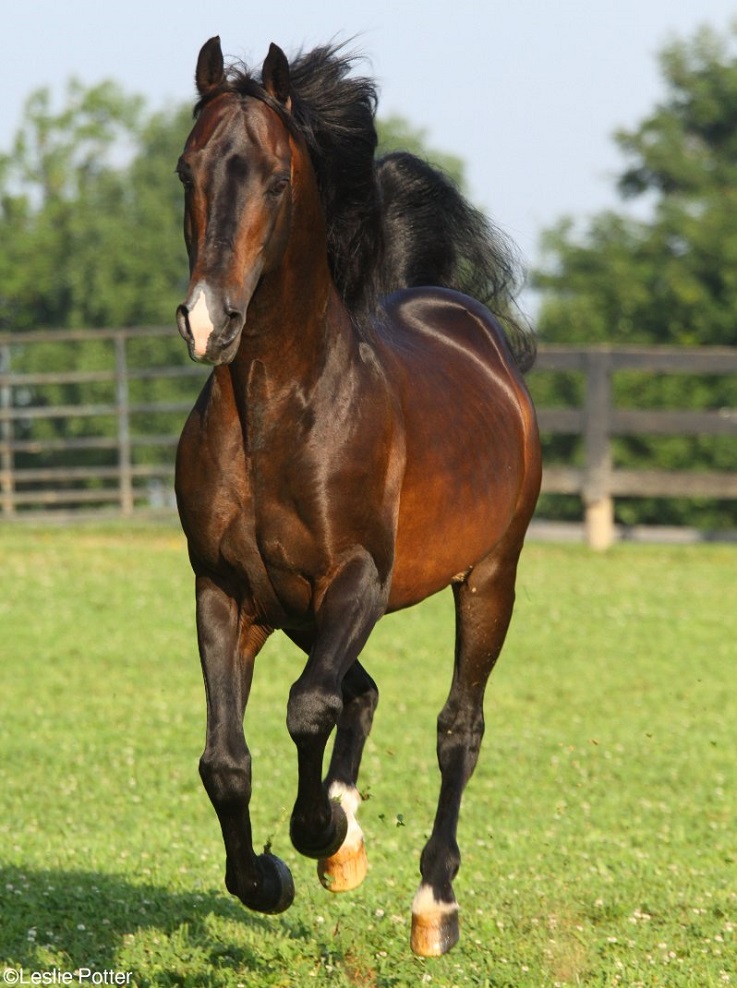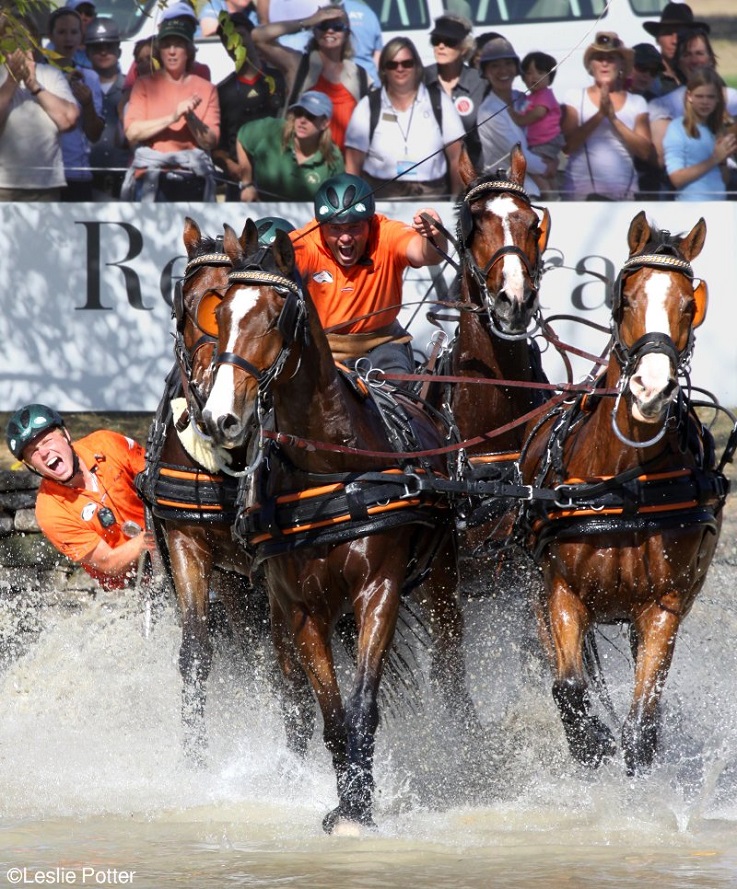Q&A with Equestrian alum Leslie Potter
 Pictured: Leslie Potter, Photo by: Kit Houghton
Pictured: Leslie Potter, Photo by: Kit Houghton
In an article for Horse Channel, William Woods equestrian studies alumna Leslie Potter writes of the things she misses about being a student at an equestrian school. Among them, Potter misses having more riding instruction than ever before, even up to four lessons per week. She loved the exposure to new ideas in the horse world, as well as cuddling up with barn cats and professors’ dogs, even in the middle of class — “assistant professors,” Potter calls them.
 Photo by Leslie Potter: Morgan stallion called Beethoven at Dragonsmeade Farm in Kentucky
Photo by Leslie Potter: Morgan stallion called Beethoven at Dragonsmeade Farm in Kentucky
“All those horses are donated,” Potter writes in reference to William Woods’ more than 100 horses, “So there were plenty of, you know, quirks, in our herd. You learned how to work with all breeds, all ages, and all personality types. You found favorites you didn’t expect,” writes Potter.
Potter is an equestrian journalist and photographer. She graduated from William Woods University in 2003 with a degree in Equestrian Science with a minor in Journalism/Mass Communications.
Look into Equestrian Studies caught up with her to hear a little more about her experience:
WWU: What made you choose William Woods University?
Leslie Potter: By the end of high school, I was pretty sure I knew what I wanted to do with the rest of my life: I was going to train Morgan show horses and teach saddle seat equitation riders. William Woods was the obvious choice for me since it has such a strong reputation in the saddle seat world. I did visit other colleges and look at other programs, but after my first visit to the William Woods University campus, my mind was made up.
WWU: How did William Woods prepare you for all that you’re doing in the equestrian world now?
LP: Of course, I didn’t end up becoming a show horse trainer. Still, my William Woods experience gave me a well-rounded equestrian experience that I don’t think I could have had anywhere else, and that really benefited me in my career as an equestrian journalist. At WWU, not only did I get to take applied riding classes in several different disciplines, I had friends and classmates from varied equestrian backgrounds. I think that was especially helpful when I first started working for Horse Illustrated. The magazine covers all breeds and disciplines, and I had at least some knowledge of all of them thanks to William Woods and the people I know from my time there.
LP: Additionally, I think there’s a lot to be said for a liberal arts education. Some of my favorite classes were ones I took just to check off a gen-ed requirement. Arguably, you can learn to be a horse trainer by forgoing college and spending time as a working student, but for me, taking classes in science and humanities and even business gave me new perspectives and taught me how to think critically, which I think is valuable for everyone, regardless of career aspirations.
WWU: What were your favorite parts of your experience?
LP: Attending local horse shows in Columbia [Missouri] was always fun because even though riding is an individual sport and sometimes we were even competing against each other, there’s still a feeling of camaraderie among the students when we’d go to off-campus shows.
 Photo by Leslie Potter: Dutch driver Ijsbrand Chardon competing at the 2010 Alltech FEI World Equestrian Games in the marathon phase of Combined Driving
Photo by Leslie Potter: Dutch driver Ijsbrand Chardon competing at the 2010 Alltech FEI World Equestrian Games in the marathon phase of Combined Driving
WWU: What is most rewarding about what you do?
LP: I’ve been really privileged to be able to attend major events like the World Equestrian Games, the Rolex Kentucky Three-Day Event, and the National Horse Show as a journalist and photographer. It’s undeniably cool to see Olympic-level horses and riders compete. But the lifeblood of the horse industry is the everyday horse owners and riders who work their butts off and make sacrifices to be able to have horses in their lives. I really enjoy photographing schooling shows, capturing a beginning rider or green horse’s first foray into the competitive world. I also love researching and writing about topics that are relevant to the average DIY horse owner and that help them better care for their horse or inspire them to pursue a riding goal. When I’ve been able to produce something that is useful or inspiring to my fellow everyday amateur riders, I feel like I’ve done my job.
WWU: Do you have any advice for current William Woods Equestrian students?
LP: Take advantage of every opportunity to ride or work with horses that you can while you’re a student. Free ride as many horses as you can every single Friday. I promise you’ll never regret a ride, but you will regret the ones you skipped. Even if you go on to work as a professional trainer, you’ll never have access to the diverse mix of horses you have at William Woods.
You can check out some of Leslie Potter’s work at lesliepotterphoto.com.
William Woods University students interested in pursuing a career in equestrian journalism can take advantage of many opportunities, including the bachelors in equestrian studies concentration in equine media.

